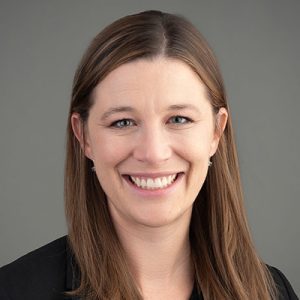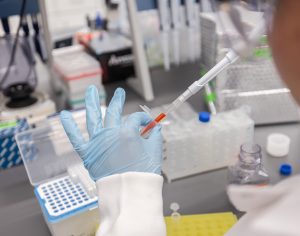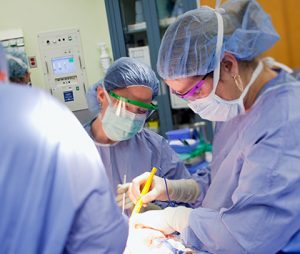It’s estimated that in 2025 more than 300,000 women in the United States will be diagnosed with breast cancer and more than 40,000 will succumb to the disease. Researchers around the globe are diligently working to improve access to early detection and treatment and reduce mortality through scientific breakthroughs. That includes work being done right here at the University of Wisconsin Department of Surgery.
There have been many advances in the treatment of cancer, especially breast cancer, in recent years.
 “Even since I started medical training [in 2011], things have changed greatly in breast cancer,” said Dr. Anna Beck, assistant professor in the Division of Surgical Oncology whose clinical practice and research focuses on breast cancer. “A lot of women are now able to do less in terms of surgery or medications, both of which come with long-term side effects. But at the same time, we’ve also been able to identify those women that really need more intense treatment, so it will be interesting to see what happens in the next 10-15 years.”
“Even since I started medical training [in 2011], things have changed greatly in breast cancer,” said Dr. Anna Beck, assistant professor in the Division of Surgical Oncology whose clinical practice and research focuses on breast cancer. “A lot of women are now able to do less in terms of surgery or medications, both of which come with long-term side effects. But at the same time, we’ve also been able to identify those women that really need more intense treatment, so it will be interesting to see what happens in the next 10-15 years.”
Continuing to improve outcomes for women who develop breast cancer is at the core of the research done by Dr. Muhammed Murtaza and his lab team. Dr. Murtaza is an associate professor in the Division of Surgical Oncology and the Director of the UW Center for Precision Medicine.
Currently, the standard of care for a breast cancer patient typically involves pre-surgical treatment, surgery and post-surgical treatment. The pre- and post-surgical treatments usually involve a combination of drugs, radiation and/or chemotherapy, all of which come with life-altering side effects. Instead of applying this standard-of-care approach, Dr. Murtaza sees great benefit in attempting to individualize the care each patient receives.

“In order to provide the best care we can for everybody, some of these patients end up getting treated far more than they actually need for their individual cancer,” Dr. Murtaza said. “For example, some patients may actually be cured following their pre-surgical treatment and the surgery to remove the tumor. Other patients clearly aren’t getting enough treatment because their cancer ultimately comes back. If we could find ways to detect how an individual patient is responding to each stage of their treatment, we would know exactly when we can stop treatment or when we need to keep going.”
That is the question that drives Dr. Murtaza’s daily work in his lab, funded in part by a three-year, $1 million Cooperative Award (UH3) from the National Cancer Institute. Dr. Murtaza and his team are developing a blood test that is sensitive enough to detect minimal residual disease, which refers to the very small number of cancer cells that might remain in the body during or after phases of cancer treatment.
“Our goal is to be able to tailor treatment plans to meet the needs of the individual patient at each step of their treatment,” explained Dr. Murtaza. “For example, if we can confidently rule out any indication of residual cancer after surgical removal of a tumor, then that patient could be spared post-operative chemotherapy and/or radiation without compromising their long-term outcomes. Similarly, if there is no evidence of residual tumor after pre-surgical therapy, it may become safe to omit surgery or limit its scope. To provide each patient with just the right extent of treatment while preserving and improving outcomes, clinicians require tests that can accurately detect residual disease.”
“The essence of the Wisconsin Idea is that this isn’t about academic productivity for its own sake, but really about how what we’re doing is having an impact on the real world.”
— Dr. Muhammed Murtaza, associate professor, Division of Surgical Oncology
Dr. Murtaza’s work is building upon a research history that has led to better outcomes for women diagnosed with breast cancer. But what if physicians were able to detect the disease earlier, or even predict with certainty who was most at-risk to develop breast cancer? Those are questions that Dr. Beck is trying to answer.
Certain types of benign breast lesions that can be found during routine mammograms are associated with a high risk of future breast cancer development, but current clinical methods to estimate the level of an individual patient’s risk are inaccurate.
“Lobular carcinoma in situ (LCIS) is a type of benign breast lesion and these lesions are an indicator that a woman is at high risk (greater than a 20 percent chance) for getting breast cancer in the future,” Dr. Beck said. “My research is focused on trying to individualize that risk and really understand what it is about their breast tissue that makes them more likely to develop breast cancer.”
When women are diagnosed with LCIS, the aftermath can be unclear for the patient.
“There’s about 1.6 million breast biopsies that are done annually in the United States. And these lesions are found in about four percent of those biopsies, so you’re talking about 50,000-70,000 cases of LCIS each year,” Dr. Beck said. “It can be a really confusing thing because, at the time it’s detected, LCIS is benign, you don’t have cancer, that’s great. But it could be a marker for future cancer. And trying to make decisions around that, it can be really confusing for people to totally conceptualize.”

The current course of treatment for anyone found to have these lesions is typically a combination of increased screening or medications. Dr. Beck’s research aims to predict with greater confidence, of those 50,000-70,000 cases with LCIS, which are the 20 percent that will eventually develop breast cancer.
As part of that research, Dr. Beck and her team are using the “All of Us” database, a research hub coordinated by the National Institutes of Health (NIH), which stores health data from participants across the United States. Nearly a million patients are currently enrolled, are sharing the data in their electronic medical record, have given a blood sample and the database houses their DNA sequencing. Dr. Beck’s study is funded in part by a 2024 Badger Challenge Award.
This information is vital, according to Dr. Beck. “From the All of Us database, we can see women who have these high-risk lesions, study their DNA sequencing and try to see if we can predict who developed breast cancer or not.”
Additionally, Dr. Beck and her team are studying breast tissue with LCIS in women who have developed breast cancer and who have been treated at UW Health.
“We’re looking at the breast tissue itself in these women to see if there’s sort of different patterns of what’s going on in cancerous breast tissue with LCIS in the hopes that will give us a better insight into who gets breast cancer.”
Dr. Beck’s study is an example of the collaboration that Dr. Murtaza says makes the University of Wisconsin the ideal venue for ground-breaking research.
“You need the best-in-class clinical practice and information associated with that,” Dr. Murtaza said. “You need the cutting edge in tools and technologies and genomics and molecular biology. You need the cutting edge thinking in computational analysis and data science to bring all of this together. There are few places that actually have all of that and then are really able to work in that interdisciplinary way to crack at problems. The University of Wisconsin is one of those places.”
In addition to clinical collaboration from UW Health, Dr. Beck’s work includes, among others, Dr. Madhu Roy, an assistant professor in the Department of Pathology and Laboratory Medicine, Dr. Mai Elezaby, an associate professor in the Department of Radiology, and Dr. Wei Xu, a professor of Oncology in the McArdle Laboratory for Cancer Research.
“One of the things that I’ve found here at UW–Madison is that it’s attracted so many intelligent individuals and everybody is really motivated to collaborate with one another and support each other’s ideas.”
— Dr. Anna Beck, assistant professor, Division of Surgical Oncology
“I think the best outcomes from research come from presenting things with an open mind and being open to what others have to say,” Dr. Beck said. “When you can pool everybody’s ideas, because everybody thinks of things a little bit differently, that leads to bigger and better results. One of the things that I’ve found here at UW–Madison is that it’s attracted so many intelligent individuals and everybody is really motivated to collaborate with one another and support each other’s ideas.”
Ultimately, the goal of any kind of translational research is to push the boundaries of what we do today in clinical practice to improve patient health and outcomes.
“Research isn’t just about academia for academia’s sake,” Dr. Murtaza said. “This is about impact, whether it’s in agriculture or it’s in business or it’s in government or it’s in biomedical research. Instead of measuring your success in papers, grants, funding, and so on, you measure your success in the impact you make. The essence of the Wisconsin Idea is that this isn’t about academic productivity for its own sake, but really about how what we’re doing is having an impact on the real world.”

Both Dr. Beck and Dr. Murtaza’s research is funded by a combination of grants and philanthropy. Other supported breast cancer research within the department includes that of Dr. Lee Wilke, professor in the Division of Surgical Oncology, who is the founder of Elucent Medical that has developed the “SmartClip” as a better way for surgeons to locate tumors during lumpectomies for breast cancer. The SmartClip is now being used in more than 300 hospitals across the United States. Dr. Wilke is also partnering with researchers at Duke University on pursuing innovative methods for treating breast cancer at its earliest stages, including development of a “shot” into the tumor to stimulate patients’ immune system as well as start treatment prior to surgery. That study was recently awarded a $10.4 million grant from the Department of Defense.
Financial support is vital to the pursuit of research breakthroughs and the impact Dr. Murtaza references.
“We’re not able to do that work without funding to support the research,” Dr. Beck said. “Here at the University of Wisconsin, a lot of our findings, a lot of the trials that we’re doing directly impact the women of Wisconsin. The grant funding, the philanthropy, all of that allows the research to happen and allows us to keep answering these questions and trying to get to that ultimate goal of preventing and curing breast cancer.”